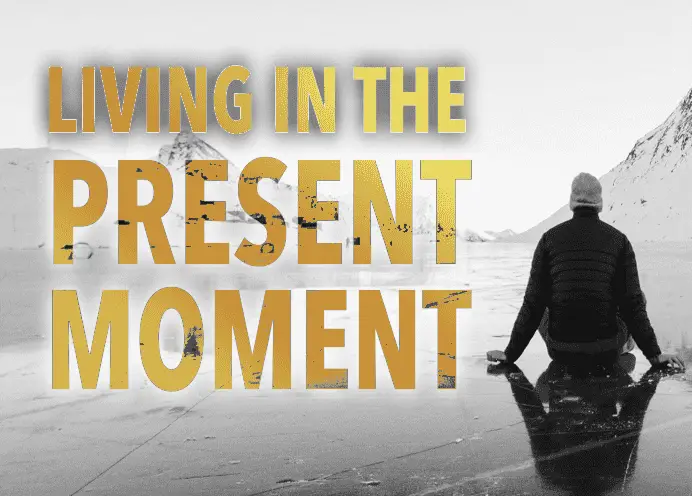You may have heard the term “living in the present moment” or “being more in the present moment” but what does “”being in the moment“” actually mean?
What does “”being in the present moment“” feel like, and how do you know when you’re in the present moment?
I personally didn’t fully grasp what being in the “”present moment”” really meant, until I realized I was never in the ‘present-moment’.
I was spending more time than I realized, thinking, analyzing, planning, and worrying “inside my head”. Physically I was present, and I was aware of what was going on around me. But mentally, my mind was always somewhere else.
My inner voice was active all the time, which made me overthink, over-analyze, and overly anxious. I was not spending as much time living life “”fully present”” in the actual moment (outside of my head) than I thought I was.
But once I realized this about myself, I knew I could do something about it…
In this article we’ll explore expert insights, perspectives, and the latest science to better understand the benefits, true meaning, and tips for being present in the moment.
Let’s Dive In.
What Does “”Living Life in the Present Moment“” Really Mean ?

Dr. Elyssa Barbash, a Licensed Psychologist, explains to her patients that those who are depressed live in the past…, Those who have anxiety live in the future…. And those with a strong calmness and peace-of-mind live in the present.
If you’re spending time re-thinking your past, or over-analyzing your future then that’s less time that you’re spending in the present moment.
Reflection is good, and so is future planning. Those are two unique human abilities that allow us to innovate and to propel us forward in life. But it’s not healthy to spend too much time reflecting and planning.
Most people aren’t aware of how much time they actually spend “in their head”. And if you’re not aware, then you can’t consciously choose whether to live in the present moment or not.
In the words of Buddha –
“Do not dwell in the past, do not dream of the future, concentrate the mind on the present moment.”
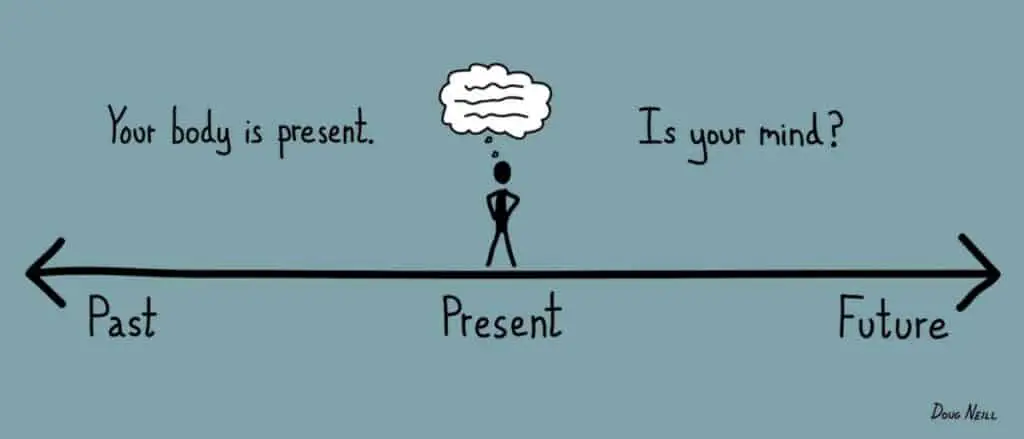
CEO of relationship development company PiVOT, Lori Jean Glass, has analyzed thousands of relationships. Through her years of relationship expertise she’s found that when people are “living more in the moment”, they’re much more aware of their emotional state, and much more aware of the thoughts that they’re having which may be triggering their emotions.
When you’re not present, your thoughts and inner voice are either focused on the past senarios or fixated on future scenarios.
Wellness expert and licensed psychologist Dr. Rachel Goldman writes that…
“living in the present moment requires you take the time to appreciate where you are…, what you’re doing…, and who is with you”…. Dr. Goldman goes on to suggest that “Instead of becoming caught up in the past, or worrying about what will happen in the future, try to savor each moment as it passes”.
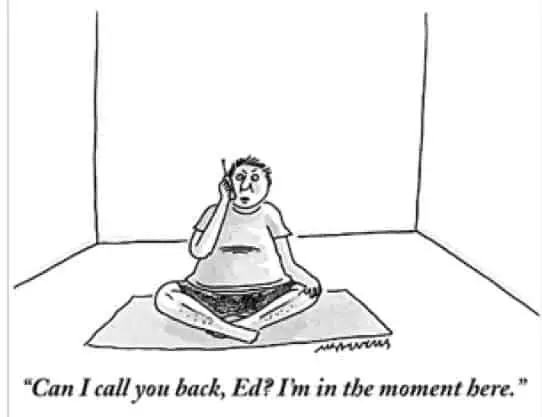
7 Benefits of Being In The Present Moment
We’ll get into HOW to be “present in the moment” below.
First, here’s WHY being more “present in the moment” is important, and how being more present can benefit you.
1. ‘Present Moment Awareness’ Can Make It Easier To Manage Stress –
In 2016, Dr. James N. Donald from the “Institute for Positive Psychology”, lead a study that looked at the relations between “”present-moment awareness”” vs. stress responses. The study which was published by Science Direct found evidence strongly suggesting that…

By cultivating ‘present-moment awareness’, it makes it easier to ‘emotionally cope’ with stressful events that are happening ‘now’ (in the moment).
2. Get More Time Out Of Your Life –
Don’t let your time get trapped. Your time is one of, if not the most, valuable resources you own.
This is exactly why businesses offer you money (or a salary) in exchange for your time . And exactly why social media companies offer you free apps in exchange for your time.

When you spend large amounts of time on your phone, time appears to pass by more quickly.
For example, spending 5 minutes on your phone (and in your head) goes by quickly and might feel more like 3 seconds… While spending 5 minutes doing push-ups (which forces you into the moment) might feel more like forever.
This is just a quick example using 5 minutes, but over the period of 1 year, or 10 years, or a lifetime, spending more time in the present moment will extend the time you have to experience all there is in life.
3. Strengthen Your Relationships –
If you’re floating through life unaware that you’re experiencing life outside the present moment (trapped in your head), it can lead to unwanted feelings of loneliness, dis-connection, and shallow ‘surface-level’ relationships with those around you.
I personally have experienced all three of those feelings in my life (and I’m probably not alone).
To strengthen the relationships of the people around you, build new friendships, and reinforce network connections, being more present in the moment is KEY.
As an example, I just got back from a family vacation with a group of 27 people and I’m usually an introvert. Being with a big group, I naturally spent more time socializing than normal. But to cope, I practiced “being in the present moment” for the better part of 4 days. Not over-thinking anything or worrying about the past. Just being OK with ‘being in the now’.
And as a result, my normal social anxiety all but disappeared as I lived moment-to-moment with-out letting my mind wander. To my own disbelief, I really enjoyed myself. And I felt a deeper connection with almost everyone.
On the ‘flip side’, one of the cousins’ husbands was “”just there”” the entire time. Barely engaging with anyone, rarely talking, and most certainly “in his head”. His relationship with everyone was stagnant at best.
When you visualize the future or think about the past more than you experience the present, you’re unconsciously making your relationships with people more imaginary than real.
Clinical psychologist Dr. Diana Hill says that “Giving your FULL presence to someone is one of the best gifts you can give.”
4. Being Present Lets You Discover New Things –

When you spend all your time thinking about the future, and the bigger picture, it’s easy to miss-out on the present (and miss all the exciting details in life).
As an example, if you drive 1 mile from your house to work every day, you can jump in your car and be there in 5 minutes or less. The first day it might be an interesting ride, but after a while everything blends together and you might-as-well be on auto-pilot.
However, if you walk or bike to work, by exercising it forces your mind to be more in the present moment. In the present moment, details become more clear. Maybe you’ll notice some sidewalk ‘chalk art’ that you otherwise would have drove right past while you’re thinking about how to respond to an e-mail.
By ‘slowing down’ and being more ‘present-in-the-moment’, you’ll discover a new variety of detail that you otherwise would just glide past. And as the saying goes…,
“variety is the spice of life”
5. Cultivate a Deeper Sense of Appreciation –

Author Sharron Skinner was recently on a trip to Paris, when she noticed tourists everywhere holding up phones to take pictures of the Eiffel Towel. But after the picture was taken, nobody was stopping to look past their screens. They were all missing the experiences in ‘real-life’. Sharron noticed everyone was opting for a ‘picture of real-life’ instead of appreciating the real thing, in the present moment.
Mrs. Skinner writes that you get more appreciation out of life by being “present” in life as we are experiencing it. As opposed to experiencing life through a screen.
6. Being In The Present Moment Decreases Anxiety And Worry –
When you’re not ‘in the present moment’, you’re in your head either thinking about the past, thinking about the future, or distracting yourself with a screen.
#1 New York Times bestselling author Eckhart Tolle, explains in his book, The Power of Now, that learning to exist in the present moment frees us from anxiety while also connecting us to the infinite calm of our essential being.
Through his research, Eckhart has found that depression, anxiety, guilt, worry and fear, are caused by our natural human tendency to live life ‘in our minds’ instead of in the present moment.
Learning to live more in the moment is universally recognized as a useful strategy for dealing with anxiety. Recent researchers have found evidence that shown people who are capable of discarding thoughts about the past and the future(also known as mindfulness), are generally happier people.
7. Present Moment Awareness Boosts Creativity
According to Mindfulness experts, Eric Langshur and Nate Klemp,…
Present moment awareness can “transform the quality of what you do, leading to greater creative flow, enhanced relationships, and increased productivity at home and at work.”
As a child we could play and be creative with toys for hours totally absorbed by the task at hand. No stress about what happened yesterday or anxiety about tomorrow. Both you and your coloring book would become one. Lines didn’t matter, just present moment creativity.
Reasons Why It’s Difficult To Live In The Present Moment
Not worrying about what happened at work yesterday and bills you need to pay in the future sounds great!
As functioning adults in society with lives and jobs, it’s just not that simple. We don’t always have time to be fully present. Which is why we try and multi task.
According to Dr. Eyal Winter and PsychologyToday, the human mind is evolutionarily hard-wired to live in both the past and the future.
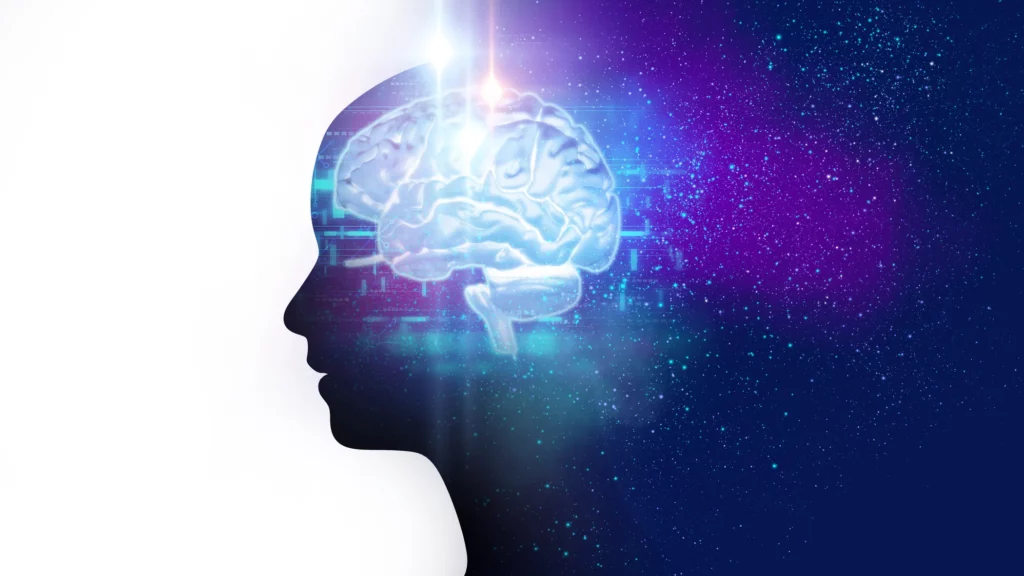
From a big picture perspective, the survival of the human species very much so depends on us learning from the past and planning for the future.
1. Difficulties of Balancing The Past, Present, And Future
Many people (myself included) find it difficult to ‘live in the present moment’ because our minds wander and it’s easier to just let yourself think about what happened yesterday, or what’s happening tomorrow.
It takes practice to control your thoughts.
The practice of controlling your thoughts is called mindfulness.
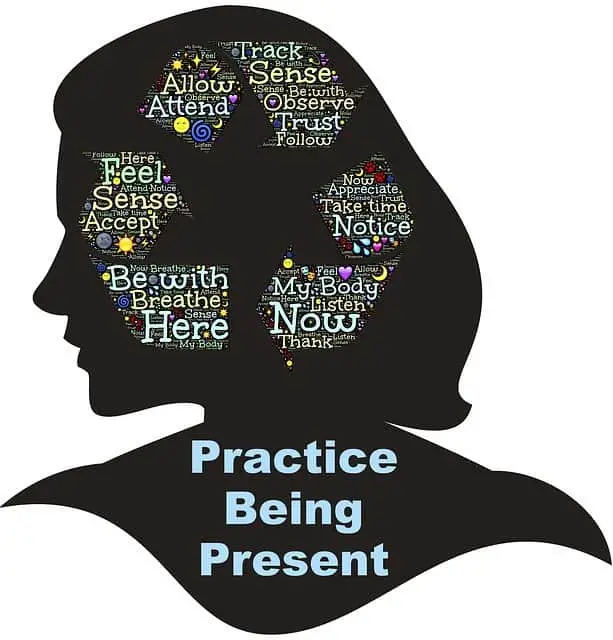
As a result, it can be easy to loose sight of whats happening right now, today. With-out being consciously aware you can fall into a routine of rarely being “”fully present””.
Experts agree that there’s unquestionably benefits to reflecting about the past, and planning for the future. But but there’s also benefits to living in the present moment. But it seems that all too often these are benefits that we tend to overlook.
2. Humans Are Bad At Multi-Tasking
According to Dr. Gemma Lavender and Dr. Arthur Markmanr, only about “10% of the population” are “decent multi-taskers”.
“There’s a small number of people who are decent multitaskers – at best, it’s 10% of the population, so chances are, you’re not one of them,”
When we’re unaware that we’re spending time ‘in our heads’, we’re usually either reflecting about the past, planning for the future, looking at a screen. When our attention is pulled away from being in the present moment, we then transplant our attention putting our focus on a different moment.
Human beings are great at a lot of things, but multi-tasking isn’t one of them.

University of California, Irvine professor Gloria Mark says that “Human beings have a limited capacity for information processing, so after a point, it’s not clear if we’re capable of doing more,”.
Because we’re bad at multi-tasking, when we split out attention away from being present, we only partially experience the present moment. And because our attention is constantly being competed for, It becomes easy to lose track of the moment that we’re currently in.
When you’re not living fully in the present moment, you’re sacrificing it.
Having social media addiction is a prime example of trading an opportunity for “living in the moment”, for living through a screen and passing the moment by.
How To Be More Present in the Moment

11 Tips To Strengthen Present Moment Awareness
1. Focus On One Thing At A Time (Don’t Multitask) –
As discussed, humans are bad at multi-tasking. Multitasking divides our attention. It makes it harder for us to give our full attention to any one thing which makes our split attention less aware and less present.
Cleveland Health Clinic Dr. Kubu has found that “The more we multitask, the less we actually accomplish, because we slowly lose our ability to focus enough to learn,” .
2. Try To Notice More of Your Emotions and Your Surroundings –
According to Dr Gary Foster, Oxford Psychology Professor Mark Williams, and other experts, the first steps towards increasing ‘present moment awareness’ is by reminding yourself to take notice.
Take notice of your thoughts, take notice of your feelings, take notice of your body sensations, and take notice of the world around you.
Every so often through-out the day stop and ask yourself two questions.
1. Where Am I Right Now.
Start with the room you’re in, then the building, then the city or town, then the state, then the country, then the planet Earth.
2. What Are My Emotions At This Very Moment, And Am I In Control Of Those Emotions.
Take notice. Once you’re aware of your present moment emotions, you have the ability to maintain present moment awareness and control them.
3. Stay Present By Practicing Mindfulness –
Mindfulness is the practice of controlling your thoughts. And by learning to better control our thoughts, it prevents distractions from unknowingly removing us from the present moment.
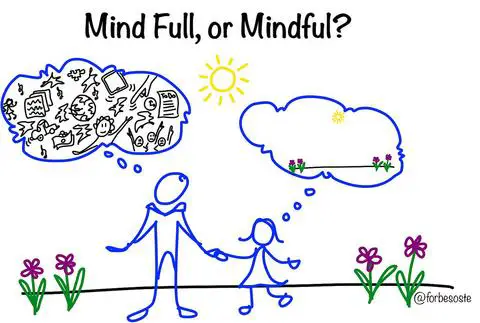
Medical Experts agree that mindfulness benefits include lowering stress levels, reducing patterns of harmful over-thinking, and protecting against both anxiety and depression.
By practicing mindfulness you become more in control of your thoughts, actions,emotions, and your overall degree of self-awareness.
Practicing mindfulness is the solution to overactive thoughts.
In the age of technology, being ‘present-in-the-moment’, and focusing your attention is becoming a lot more important, and a lot more difficult than in times past.
Especially in today’s age of shrinking attention spans, internet addiction, and social media.
4. Accept Reality To Better Enjoy The Present Moment
Reality Does Not Always Happen The Way We Want It To
When you’re in the present moment the unfiltered version of reality is all you have to react to.
Accepting reality can be difficult and sometimes painful. But by accepting reality, and the emotions that come with accepting reality, it opens the door for a greater capacity for future personal-growth.
Accepting reality leads to present-moment clarity. And from clarity comes productive actions.
If you think of the most intelligent and most successful people you’ve ever met, reflect whether their attitudes are generally one of acceptance or denial.
Successful people understand that if there’s a problem then there’s a solution. Very rarely do you highly productive individuals complain about problems, they expect them, accept them, find solutions, and move on productively.
Accept the present moment, and then keep moving forward.
5. Take A Break From Social Media, Screens, And Internet Technology –
Working in the best interest of the company, social media companies program their algorithms to show people using their platform the type of content that is most likely to keep them attentive and “engaged”.
It’s easy to spend too much of your precious time behind a screen or scrolling on social media.
Screens aren’t all bad (you’re on one right now), but social media companies make money and are incentivized to grab people attention on their platforms.

Social media companies use billions-of-dollars worth of user ‘psychology data’ to design ways to keep users attention on the screen. So how do you stay connected with-out having your attention ‘sucked-in’? The answer is to practice being more conscious and mindful of your social media use.
The more time you spend on social media, the less time you spend in the present moment.
6. Use Yoga And Breathing To Connect With The Present Moment –
This is not a cliché or trendy recommendation.

I was skeptical about yoga when I was first introduced to it. And as a side note: Here’s How Yoga Has Benefited Me – From Skeptic to Believer.
The concept of Yoga was first documented as a path to self-realization in the ancient “Vedas Texts” which date back to 1500 BC.
According to PositivePsychology
“When we focus our attention on our breath, we have no choice but to be in the present.”
Yoga teacher Kelle Yokeley coaches her students to find the ‘present moment’ through deepening our mind – body connection and harmonizing our overall frequency with our breath.
Our minds may wander to the past, present, and future, but as Kelle says, “our breath is ALWAYS in the here and now. Our breath is our constant connection to the present moment.”
I’m hardly a yoga intermediate, but if there’s anything I know for sure, it’s that the key to yoga is breath work.
7. Get Regular Exercise –
Exercising forces you into the present moment.

When you’re sitting in a chair or sitting on your couch, it’s easy to get lost in the ‘throws of your mind’. But when you’re using your full body to exercise, play basketball, lift weights, ect, it forces you out of your head and into the present moment.
Also, when you do physical activity, you trigger a chemical response in your brain. One of the chemicals released is called DOPAMINE which can work wonders for improving your body image, self-esteem and overall mental health.
8. Use Your Down Time Mindfully –
When you have ‘down time’ at home or break time at work how do you spend that time? Do you distract yourself with anxiety eating? Scrolling on social media or the internet? Hulu or Netflix? Or watching mindless TV shows ?
If you answered yes to any of those, then you probably could be leveraging your time more productively and more efficiently.
Try scheduling your down time for future planning or past reflection. By scheduling time for both you don’t have to multi-task and ‘retreat into your head’ when you should be enjoying the moment.
9. Practice Being Present In The Moment With Kids –
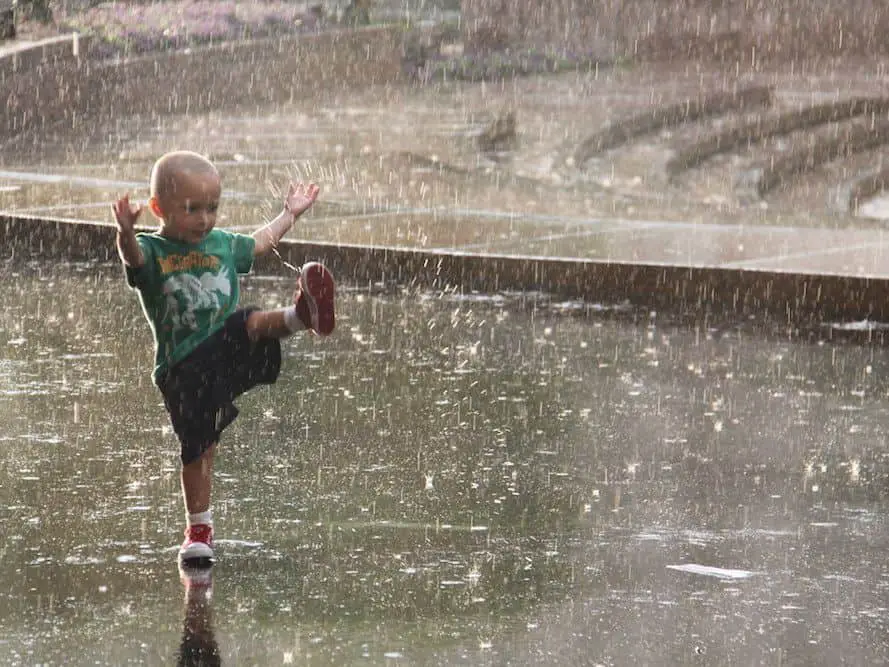
Kids live in the present moment all the time. When a kid is at the water park, they’re not thinking about what’s for dinner or if that meeting went well onThursday or not. They’re 100%in the moment enjoying being present.
That’s something that most adults could learn from (myself included).
10. Conduct a Mindful Review of Your Day –
To be more aware of yourself during your day, try giving yourself time at the end of your day (maybe right before you go to bed) to process your day, your emotions from the day, and the moments you experienced throughout your day.

By giving yourself time to process, it allows your brain to store and process your thoughts so your mind will be fresh and clear the next day.
Starting the day off with clarity will give you a better chance of being present and staying present throughout the rest of the day.
11. Do A Body Scan –
Body scanning is exactly as it sounds. It’s a focused effort that involves the practice of consciously scanning your body for sensations of pain, tension, or anything out of the ordinary.
Body scanning helps you develop a greater present moment awareness of your body. A higher level awareness can help you feel more connected to your physical self and help you gain a deeper insight into causes and effects of unwanted feelings and emotions.
According to registered psychotherapist Elaine Smookler (who is also a mindfulness coach with over 25 years of practice…
Practicing ‘body scans’ enhances your ability to bring your full attention to real-time experiences happening in the present moment.
Body scanning also trains you to explore both pleasant and unpleasant feelings, which in-turn forces you to learn to notice what happens when you simply ‘hang in there’ and feel what’s going on in “body-land” without trying to fix or change anything. Just be aware, present, and still.
Conclusion: Living More In The Present Moment
Living in the present moment means being more engaged with the world around you. There’s a time & place for deep insight, internal reflection, and future planning. But the time for being more present in the moment is always now.
There are clear benefits to living less inside your head and more present in the present moment. The biggest benefit is just spending less of your time on Earth anxiously worrying, and more time presently enjoying life.
If happiness is the goal, then spending more time living in the present moment is the ladder to get you there.
“The secret of health for both mind and body is not to mourn for the past, worry about the future, or anticipate troubles, but to live in the present moment wisely and earnestly.”
-Buddha
Loved what you read?
Hit that share button and let the world in on the secret – we’d be thrilled!
Got thoughts? We’re all ears for your feedback, corrections, or a good old chat. Don’t be shy; drop us a line.
And hey, don’t miss out on our curated list of must-reads in the recommended books section.
Big thanks for diving in with us today!


